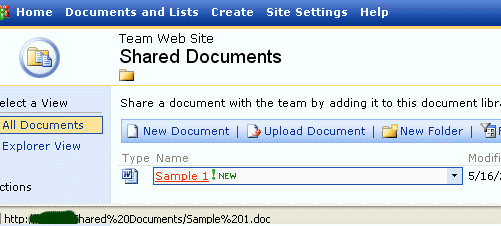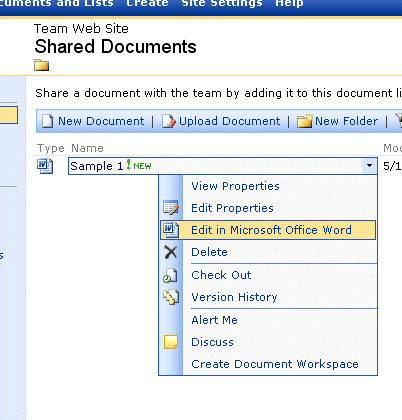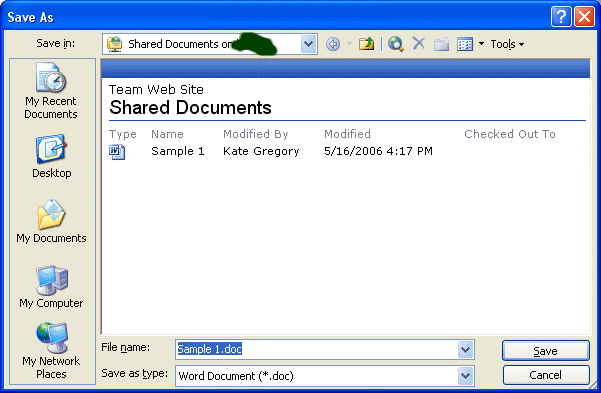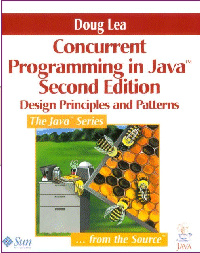 Tuesday, 16 May 2006
As you probably know, when you're looking at a document library in Sharepoint, each document name is a link to the document:

If you click the link, the document opens in Word. I do that a lot, or else I right-click the link and Save Target As to put a copy on my own machine. You probably also know that there's a menu hanging off that triangle, and you could edit the document using that menu:

What I didn't realize until today is that these two choices behave differently. Click the link and Word opens the document as Read Only, so that when you click the Save icon in Word or choose File, Save, you get the Save As dialog. You can save it back into the same Sharepoint directory you opened it from, but it's an extra step:

If you use the menu item, it's not read-only and if you save it just saves with no further conversation. Now normally I would NEVER drop down a menu and choose an item from it when I could click a link. But since it turns out there's a difference, I'm going with the menu from now on.
Kate
 Monday, 15 May 2006
Spotted on the Monster Jobs Blog, ten rules for being a happy employee. I think that even though these rules are designed for the benefit and enjoyment of the individual, it would make your employer happy if you followed them. These are a good way to live. My favourite? "You Will Make Mistakes -- It’s How You Handle Them That Matters" . I tell my kids (and staff) something very similar quite often. Anyone can give into temptation, screw up, forget, or make a mistake once in a while. What matters is what you do next. Lying, covering up, blaming, denying, and not learning are the bad things here. A close second: "It Takes More than Talent". The only iffy one? "Keep Business and Romance Separate". But then again, we were already married when we started this business together, so that's not the same as falling for each other at work. I like having all my eggs in one basket. That way I know where they all are 
Kate
 Sunday, 14 May 2006
While at DevTeach, a colleague was struggling with a laptop that was flaky because it was running hot. He had it on an exhibitor's table, which was cloth-covered, and the soft surface was impeding the vents, which were mostly on the bottom. I passed along this tip to him, and I just heard that it worked as well for him as it has for me, so I thought I'd share it more widely.
Take three or four pens, the same size as each other, and lay them parallel on the desk or table like this: I I I I
Then carefully put the laptop down onto the pens. If you only had one it would wobble, if you only had two it would roll around, but three or four are pretty stable. Presto, your cooling is dramatically improved and your laptop stops being quite so flaky. I've even presented like this, for one of those talks with two VPCs that really pushes your CPU hard.
Kate
 Saturday, 13 May 2006
In the June MSDN Magazine, Stan Lippman's Pure C++ column has become Netting C++. Here's the path he's laid out for himself. He's starting with a working console application written entirely in native C++. In this first column he's just going to make it run as a .NET executable with no use of .NET libraries and no exposing his classes to other .NET applications over the runtime. In the next column, he'll show how to wrap the native classes in managed wrappers so they can be called from VB or C#. Stan goes on to say:
Subsequent columns will focus on mapping the native types to types supported by the .NET Common Type System (CTS) and examining the performance characteristics of the application as it transitions. We'll also look at the type information available to the runtime, using the ildasm command to explore the Common Intermediate Language (CIL) into which all .NET-based languages are compiled.
When that's done, we'll explore multithreading, Web services, cross-language interoperability with a C# ASP.NET front, XML support, and integrating with Windows Vista™. So, we have our work cut out for us.
This will be a series to read as it appears.
Kate
 Friday, 12 May 2006
Jerome Carron from Microsoft will be coming to the East of Toronto .NET User Group May 17th to talk about mobile applications:
This session will be an introduction to developing Windows Mobile applications with Visual Studio 2005. The focus of the session will be on Devices and the Mobile platform, getting started with device development (user interfaces and controls), data management (SQL Server Mobile) and Visual Studio tools for Data Management and close out with a look at Windows Mobile 5.
This meeting will be at the Whitby Library. Please register so we're expecting you.
Kate
 Thursday, 11 May 2006
Jean Rene sure knows how to run a conference. In previous years he has bought women's-sized shirts for the women speakers, but this year he even got us a different colour scheme! Here are Julie and I modelling them:

I just love coming here!
Kate
 Wednesday, 10 May 2006
Rory blogged what I was thinking... "SEVEN PILLOWS HOTEL WHY???!!!?!"

And then his pictures prove that the bed he faced and which lit this question in his brain is in fact identical to the bed I faced last night myself. How scary is that? Rory is not at Devteach, is he?
My guess (nay, I'm pretty sure it's my fervent hope) is that he is at another Marriott somewhere else and not in my room here in Montreal taking pictures and blogging.
Kate
In my concurrency talk today I had a total brain freeze and could not remember the last name of the author of the concurrency book I wanted everyone to read. The title is Concurrent Programming in Java: Design Principles and Patterns and the author is Doug Lea. Don't let the word Java in the title fool you: this is a book that explains the concepts of concurrency no matter what language you're going to use in the end.

Kate
 Tuesday, 09 May 2006
The ISO C++ committee is working on the next standard for C++. At their April meeting, a number of items were added to the working draft, which means they will almost certainly end up in the standard -- it's just a matter of final agreement on some of the subtle details of the item, rather than whether it should be there or not. As Herb Sutter reports, the items that were added are:
- TR1, a pile of library changes (as opposed to the language itself) including various new kinds of smart pointers
- declaring variables but letting the compiler deduce their type instead of doing it yourself (auto type deduction).
- delegating constructors
- the > > vs >> subtlety that Brandon referred to in his recent Channel 9 interview. Visual C++ takes care of this already, but now it's being added to the standard.
- extern template
Now why should an ordinary programmer care about the machinations of the standards committee, and something that may or may not get approved this decade? Well for one thing, the compiler vendors don't wait for the standard before they implement the new keyword or the new functionality. And for another, it can give you a hint about what's headed your way. Let me tell you what I mean.
Here are Herb's examples of auto type deduction:
auto x = 3.1415926535;
auto i = container.begin();
In this case, x has type double, and i has type map<string,unordered_map<int,tuple<float,string,const int> > >::const_iterator or whatever the right type happens to be, without having to spell it out.
Now in and of itself this is a cool feature, especially for C++ with heavy STL use. Another thing Brandon talked about in his Channel 9 spot was how foreach saves us from having to declare those iterators, set things to begin() and so on, and there's no doubt that figuring out the types is part of that pain. But go beyond that for a moment. I have seen plenty of auto-type deduction examples in C# over the last year or so, and they were all LINQ examples. Does this mean C++ will get getting LINQ too? At least one language barrier to LINQ will be going. Let's see what else happens.
Kate
 Monday, 08 May 2006
I'm guessing that when Channel 9 came by to talk to Martyn Lovell, they got Brandon to agree to be next. His interview has been posted and has some cool quotes in it:
- "I only learned C++ about 4 years ago"
- "Visual C++ is the only language that can get to every API Microsoft ships"
- "C++ is the most widely used language in the world, and it's not going anywhere"
He discusses verifiable code, his favourite new language features, and templates-vs-generics as well. Take a look!
Kate
© Copyright 2024 Kate Gregory
Theme design by Bryan Bell
newtelligence dasBlog 2.3.9074.18820   | Page rendered at Tuesday, 03 December 2024 13:51:04 (Eastern Standard Time, UTC-05:00)
|
On this page....
Pluralsight Free Trial
Search
Navigation
Categories
Blogroll
Sign In
|